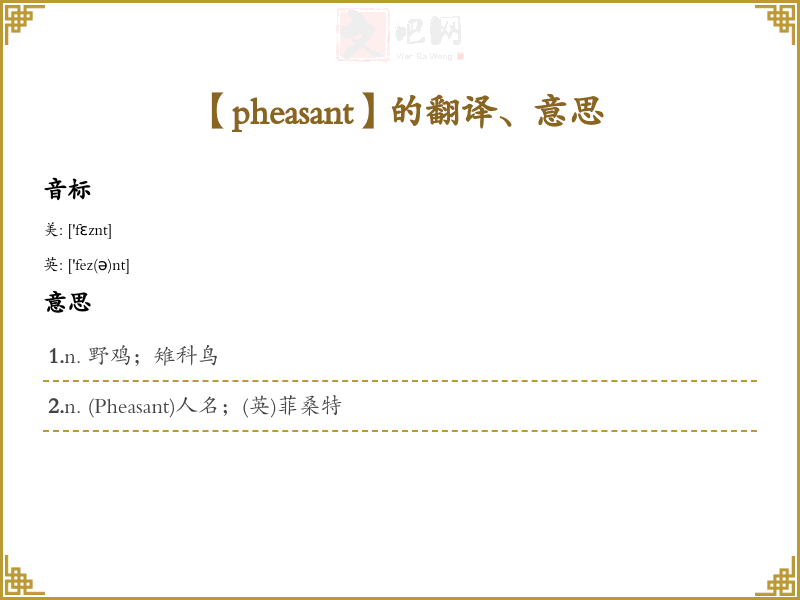【pheasant】的翻译、意思
时间: 2025-01-26 02:03:42
【pheasant】怎么读
美:['fɛznt]
英:['fez(ə)nt]
【pheasant】是什么意思、字义解释
1. n. 野鸡;雉科鸟
2. n. (Pheasant)人名;(英)菲桑特
【pheasant】的详细解释
1. 基本定义:
- 字面意思:Pheasant(野鸡)是一种中等至大型的鸟类,通常具有鲜艳的羽毛,主要分布在亚洲和欧洲。它们常被认为是一种狩猎的目标。
- 词性:名词(noun)。
2. 词源与起源:
-
词源分析:Pheasant 源自拉丁语“phasianus”,意为“来自法西斯(Fasius)河的鸟”。“Fasius”可能指代现代的伏尔加河,因而与该地区的鸟类有关。
-
历史背景:该词的首次记录可以追溯到中世纪,尤其是在英语中,pheasant的使用与贵族狩猎和宴会文化密切相关。
-
课本:在**,pheasant 可能出现在初中和高中的英语教材中,特别是在自然科学和生态相关的单元。美国的教材中,pheasant 可能在生物课或环境科学中出现,适合中学阶段。
3. 使用场景:
-
正式与非正式语境:
- 正式语境:在生态学研究或环境保护报告中,可能会提到pheasant的栖息地及其生态作用。
- 例句:The decline of the pheasant population has raised concerns among conservationists.(野鸡数量的下降引起了保护主义者的担忧。)
- 非正式语境:在日常对话中,人们可能会提到pheasant作为一种美食或狩猎活动。
- 例句:We went hunting for pheasants last weekend.(我们上周末去打野鸡了。)
-
特殊场合:在法律或野生动物保护的讨论中,pheasant可能被用作保护物种的案例。
- 例句:Legislation is needed to protect the pheasant from overhunting.(需要立法来保护野鸡免受过度捕猎。)
4. 示例句子:
- The male pheasant is known for its bright plumage.
(雄性野鸡以其鲜艳的羽毛而闻名。) - Pheasant hunting is a popular sport in many rural areas.
(在许多乡村地区,打猎野鸡是一项受欢迎的**。) - The pheasant was served as the main dish at the banquet.
(野鸡作为宴会的主菜被上桌。) - Farmers are concerned about the pheasant population affecting their crops.
(农民们担心野鸡数量会影响他们的农作物。) - In the wild, pheasants are often preyed upon by foxes and hawks.
(在野外,野鸡常常成为狐狸和老鹰的猎物。)
5. 同义词与反义词:
- 同义词:Bird(鸟),fowl(禽类)。这些词可用于泛指鸟类,但pheasant特指一种特定的鸟类。
- 反义词:Mammal(哺乳动物)。这两个词代表不同的动物类别,pheasant是鸟类,而mammal则是哺乳动物。
. 学方法:
词根记忆法:记住“pheasant”的词根“phas-”,可以联想到与鸟类相关的词汇,如“pigeon”(鸽子)和“ falcon”(猎鹰),帮助记忆不同的鸟类。
7. 关联词汇:
- Wild(野生)
- Hunting(狩猎)
- Conservation(保护)
- Plumage(羽毛)
- Habitat(栖息地)
通过以上的分析和示例,可以更好地理解和运用“pheasant”这个单词。
【pheasant】例句
1、[N-UNCOUNT] Pheasant is the flesh of this bird eaten as food. 野鸡肉
例:...roast pheasant.…烤野鸡肉。
